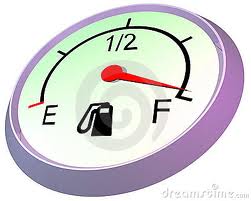Did you know that experts recommend coaches to give players 5 responses of praise to every 1 remark of criticism? They refer to it as the magic ratio; 5:1.
Think of your players, as you would think of your car. If you fill your cars’ gas tank with gas, you can go anywhere you want.  If the tank is empty, you can’t go anywhere. Athletes experience the same process. Fill their emotional tanks with praise, and they feel they can do anything. Deprive them of praise, and their self confidence plummets, and they will feel discouraged.
If the tank is empty, you can’t go anywhere. Athletes experience the same process. Fill their emotional tanks with praise, and they feel they can do anything. Deprive them of praise, and their self confidence plummets, and they will feel discouraged.
Coaches aren’t the only ones who have access to an athletes emotional tank. Teammates do as well. Ask your players to think about the kind of things that make them feel valued and confident on the playing field. Allow them to realize what kind of praise really sits with them as athletes. Then ask them to offer these kinds of statements to their teammates. Sometimes praise is appreciated on a higher level if it comes from a peer.
All praise is good, however, if you really want praise to resonate with your athletes it must be; authentic, specific, immediate, private and clean. A good way to remember this is by giving your athletes ASIP of Confidence.
Authentic – Praise must be sincere, as a coach you must mean what you say. It must be spoken in the most genuine of tones.
Specific- a simple “good job” doesn’t inform the athlete which skill they performed well. Make sure you insert a specific aspect in your praise. For example; “that was great, you kept your hands inside the ball on that last swing.”
Immediate – Praise should be delivered immediately after the action is committed. Giving praise so quickly helps to reinforce specific skills as opposed to whole performances.
Private – Although it may seem like a good idea to boast a players skills in front of their peers, it can actually keep them from putting in their best effort. Some athletes may be teased, or called the coaches pet if they are constantly praised in front of the team. Other players may just simply be too shy to enjoy public praise. Praise is more authentic if done in private, the athletes know it is meant only for them, and there is no other reason for the comment, rather then simply complimenting their talents.
Confidence – Yes, praise does enhance confidence, however the “C” in confidence also stands for Clean. Praise must be clean in order for it to be effective. Try to keep yourself  from giving praise in order to get a future action in return. Stray from telling an athlete something meaningless and nice in hopes they will do something different, and completely unrelated tomorrow. Also, keep the word “but” out of your praising statements. If you say; “You did a great job at keeping your head up at practice today, but it’s unacceptable to show up 20 minutes late.” The statement after the “but” completely ruins the credibility in the prior comment which was authentic, specific, and private praise.
from giving praise in order to get a future action in return. Stray from telling an athlete something meaningless and nice in hopes they will do something different, and completely unrelated tomorrow. Also, keep the word “but” out of your praising statements. If you say; “You did a great job at keeping your head up at practice today, but it’s unacceptable to show up 20 minutes late.” The statement after the “but” completely ruins the credibility in the prior comment which was authentic, specific, and private praise.
ASIP Give your athletes a ASIP of confidence with praise that is Authentic, Specific, Immediate, Private and Clean.
Quote of the day:
“Ability is what you’re capable of doing. Motivation determines what you do. Attitude determines how well you do it.”- Lou Holtz

Excellent… very nicely done! Each point was very well explained, with good examples.
Great stuff! Thanks for sharing.